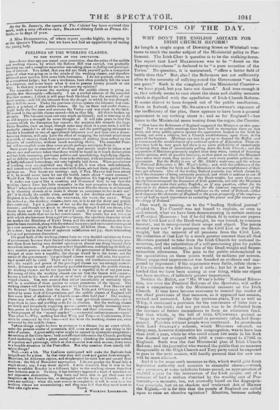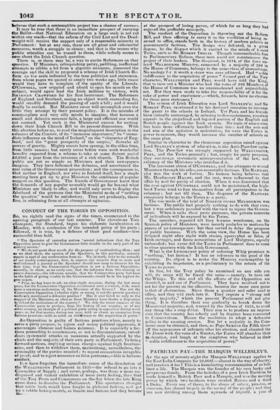TOPICS OF THE DAY. •
WHY DON'T THE ENGLISH AGITATE FOR
IRISH CHURCH REFORM?
AT length a single organ of Downing Street or Whitehall yen. tures to touch the tender subject of the Ministerial policy in Par- liament. The Irish Chur .h question is to be the stalking-horse. The report that Lord MELBOURNE was to be " dumb on the Appropriatiou-clause" is declared to be " a pure invention of the Tories." No question, it is maintained, " offers a better field of battle than this." But, alas I the Reformers are not sufficiently alive to the necessity of rallying-round the Government " on this one point." Such is the complaint of the Ministerial Courier- " we have piped, but you have not danced." And true enough it is, that nobody seems to care about the sham and shabby measure which is dignified with the appellation of Irish Church Reform. It seems almost to have dropped out of the public recollection. Even in Ireland, since Mr. SH ARM AN CRAWFORD'S exposure of the inefficiency of the plan, there appears to have been a general agreement to say nothing about it ; and as for England !—but listen to the Ministerial moan issuing from the organ, the Courier.
" How have the Reformers of England supported the Ministers on this ques- tion? Few or no public meetings have been held to strengthen them on this point, and array public opinion against the oppressions heaped on the Irish by forcing, not even a religion, but a Church establishment, upon them, at the point of the bayonet. Meetings can now be got Up to demand the Ballot, and to recommend the establishment of a national system of Education. These ob- jects; may both be very good, but there is no more probability of immediately achieving them than of immediately pulling down the Irish Church ; and the supporters of Ministers grievously neglect their duty when, instead of directing public opinion, with all possible intensity, to that point on which the Ministers have taken their stand, they scatter it abroad over every possible political im- provement. But the Ballot is one of Mr. Child's nostrums, and the scheme of National Education is Mr. TVyse's hobby ; and, with the selfishness of the Tories, they sacrifice the Irish and the Ministers to the accomplishment of their own pet schemes. One of the leading Radical journals, too, which claims for itself the character of being eminently practical, and which is anxious to cut iff a few pensions from the Civil List or the Dead.weight, has more than once openly discountenanced the discussion of Irish questions, and told the Ministers that they must make their policy English; as if any question, either for its present or its future advantages—either fin- the immense importance of the principle at issue, or the immediate influence on the mind of Ireland—either as it concerns the character of England or the great prosperity of the empire—. were of half as much importance as curtailing the power and:the revenues of the clergy of Ireland."
One word, in passing, as to the "leading Radical journal" alluded to. The Courier was not bound to explain, or even to understand, what we have been demonstrating in certain sections of Practical Measures : but if he did think fit to notice our papers on the Civil List and the Dead-weight, he was bound, in common honesty, not to misrepresent their scope and object. The points mooted were not" a few pensions on the Civil List or the Dead- weight," but the removal of all pensions from the Civil List, the reduction of that List by a much greater amount than all that Ministers pretend to take from the Irish Church for national in- struction, and the substitution of a self-pensioning plan fur public servants, civil and military, in lieu of the Dead-weight and Super- annuation allowances. The gain to the public contemplated in the speculations on these points would be millions per annum. Every suggested improvement was founded on evidence and sup- ported by argument : if the arguments were futile, refute them— if the evidence was defective, set it aside ; but let it not be pre- tended that we have been aiming at one thing, while our object has been another, of infinitely greater importance.
Neither the Ballot, nor "Mr. Wyse's hobby" National Educa- tion, nor even the Practical Reforms of the Spectator, will suffer from a comparison with the Ministerial measure on the Irish Church. It may have become necessary to remind the reader of the chief provisions of that measure, as it appeared last session, revised and corrected. Like the previous plans, Tory as well as Whig, it contained a provision for the conversion of tithe into a charge on the land ; and ten per cent, was to be deducted from the incomes of future incumbents to form an educations fund. But that which, in the bill of 1835, O'Co:exes.r praised as " large in principle" though small in pecuniary value, had disap- peared. nuishes without people were continued. In accordance with Lord S TA NLEY'S scheme, which Ministers adopted, no clergs man, however diminutive his congregation, was to have less than 3001. a year, while he who could count 100 souls in his flock was deemed not overpaid with 500/. a year—equal to £7001. its England. Such was the last Ministerial plan of Irish Church Reform; and the journalist who warned the public that no measure disagreeable to the High Church and Tory party could be expected to pass in the next session, will hardly pretend that the new one will be more eilicieist.
Awl it is for some such measure as this, which would give fresh legislative authority and sanction to shameful abuses,—which till t■ratnises, at some indefinite future period, an appropriation of 5u,coui. a sear for the instruction of the Irish people, out of a revenue a half a million clutched by the wealthy sect of Pro- testants,—a measure, too, not avowedly based on the Appropria- tion principle, but on an obsolete and irrelevant Act of HENRY the Eighth,—it is for this that the people of England are called upon to raise an abortive agitation ! Abortive, because nobody
believes that such a contemptible project has a chance of success.
It may be true that there is no immediate prospect of carrying the Ballot—that National Education on a large scale is not yet within our reach—that the reform of the Civil List and the Dead- weight will receive the support only of a respectable minority in Parliament : but at any rate, these are all great and substantial Measures, worth a struggle to obtain; and that is the reason why public attention can be roused to them, while nobody seems to o are about the Irish Church question.
There is, or there may be, a way to excite Reformers on that question. If Ministers, relinquishing paltry, peddling, ineffectual attempts to nibble a bit from a gigantic nuisance, possessed the courage and the skill to propound a scheme of Irish Church Re- form on the scale indicated by the true politician and statesman, from whose pages we quoted so amply two weeks ago, little cause would they have to complain of the apathy of the Liberals. O'Cosr:sgte, now crippled and afraid to open his mouth on the subject, would again lead the Irish millions to victory, with SHARMAN CRAWFORD for his first lieutenant. The Reformers of England and Scotland, seeing an object worth contending for, would steadily demand the passing of such a bill ; and it would bnally be carried. But Ministers never will accomplish even the little they attempt by their present policy. It is the mistake of commonplace and very silly minds to imagine, that because a small and delusive measure fails, a large and efficient one would not succeed. Yet such is the Ministerial excuse for cutting down their Irish Church Bill to its present dimensions. With this abortion before us, to read the magniloquent description in the columns of' the Courier, of its "immense importance," its " imme- diate influence on the mind of Ireland," on the "character of Eng- land,- and the "great prosperity of the empire," disturbs all powers of gravity. Mighty events have sprung, in the olden time, from little causes; but surely never before were such wonderful benefits expected from a scheme to take at some distant period 50,000/. a year from the revenues of a rich church. The British public are not so simple as Ministers and their newspapers imagine. They have fathomed the delusion, and ascertained the real value of the Government proposition; and the consequence is, that neither in England, nor even in Ireland itself, has a single meeting been got up to give Ministers the semblance of popular support on this question. The friends of Government know that the demands of any popular assembly would go far beyond what Ministers are likely to offer, and would only serve to display the falsehood of the pretence that the Ministerial mode of "settling the question" would be satisfactory. They act prudently, there- fore, in refraining from at all attempts at agitation.



























 Previous page
Previous page